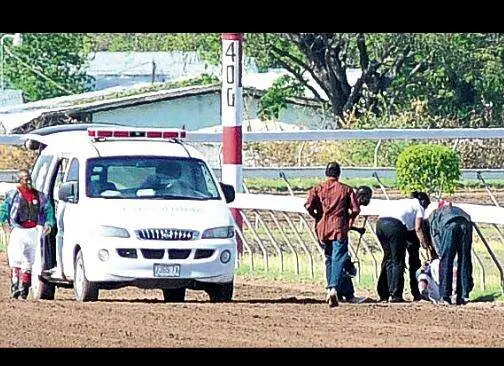
Too slow for comfort
No one needs to tell even a non-racing person about the dangers that are inherent in horse racing.
Jockeys are usually the most affected as they have the task of riding horses who weigh more than a 1,000 lbs and who run at speeds of over 30 miles per hour. There is always an element of fear present among jockeys.
In all racing jurisdictions, including Jamaica, there is a procedure to have a medical post at the racetrack along with an ambulance and certified medical staff to drive behind the horses at a safe distance in order to provide the all-important first responder’s medical aid in case there is a fall or anything untoward during the running of a race.
In fact, in Jamaica the raceday stewards will not allow a race to be run if the ambulance and an attendant medical crew are not present.
On Wednesday last at Caymanas Park, the ambulance and medical personnel were in place, but in one frightening instance they were too slow to respond to what could have been a life-threatening situation.
During the running of the day’s sixth race, when the horses entered the home stretch, top apprentice Shamaree Muir fell from his mount Gran Corazon close to the two-furlong marker.
Muir, the champion apprentice of 2013, laid on the ground, not moving for quite a while. The ambulance and medical team were nowhere in sight. For some minutes, all eyes were trained on Muir and doubts about his condition began to emerge.
Then, rather late, the ambulance emerged from behind the gates and rushing to the stricken rider. The medical team was finally able to assist Muir, placing him in the ambulance and taking him to the medical post.
Later, the official announcement came that Muir was suffering from a mild concussion and would not be able to complete his riding assignments for the day.
All well and done and this writer is happy that Muir did not receive more telling injuries. But what if Muir’s situation was worse? What if he required really quick attention? Those vital first seconds and minutes could have meant the difference for this young man.
To be fair, however, the ambulance at Caymanas and the medical staff are usually on spot to provide first aid care in situations similarly to what obtained on Wednesday.
The problem arises when there are races with more than 12 starters, as both sections of the gates, the section with 12 starting positions and the section with four, have to be joined together. When the full 16 gates are in use, the ambulance driver has to wait until the tractor driver of the gates moves them in order to follow the horses.
Given what happened on Wednesday, a way has to be found by the promoting company to allow the ambulance and medical staff to move on a more timely basis. Suggestion: When the full gates of 16 are in use, allow the ambulance to follow on the infield. There they will have full access and will be able to respond in time, if necessary. If this suggestion is not feasible to those at the promoting company, then another way has to be found before there are regrets.
























